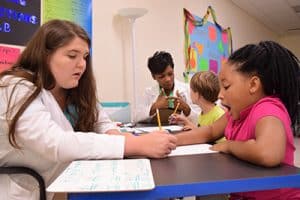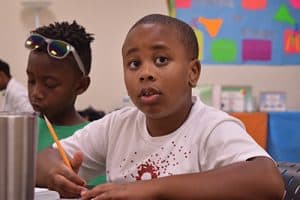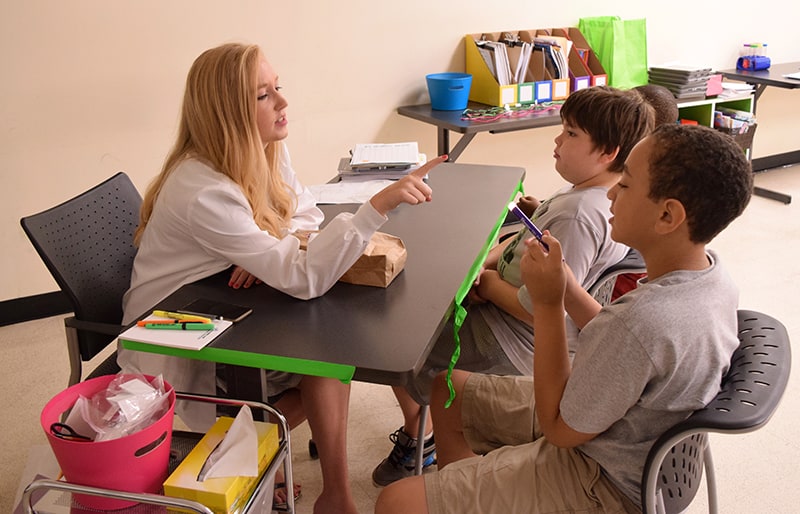Speech Pathology Students Teach Reading Skills in Summer Camp
| Dec. 6, 2016 | For some children, reading comes naturally. For others, it can be a difficult and frustrating endeavor. Camp Can Read worked to give those struggling readers the tools that they need to unlock the mysteries of reading — and make it fun.
Camp Can Read was a six-week course sponsored by the University of Arkansas at Little Rock (UALR)/UAMS Speech and Hearing Clinic. The clinic, located on the UALR campus in the University Plaza, was a collaboration of UAMS’ College of Health Professions and UALR’s College of Education and Health Professions.
“Camp Can Read was designed for struggling readers, particularly those who have trouble with decoding and spelling,” said Chenell Loudermill, Ph.D., a clinical instructor and clinic coordinator for speech pathology in the UAMS Department of Audiology and Speech Pathology.

Taylor Russell (left), a student in the Master of Science in Communication Sciences and Disorders program, and Chenell Loudermill, Ph.D., a clinical instructor and clinic coordinator for speech pathology in the UAMS Department of Audiology and Speech Pathology, work with two children on spelling skills during Camp Can Read.
“We focused on five core areas — phonics, phonemic awareness, vocabulary, fluency, and reading comprehension. Within those areas we also strategically address spelling (phonetic and non-phonetic words), and morphological awareness — in our instruction,” Loudermill said.
The camp met two days a week for three hours. Each morning started with whole group instruction that targeted reading comprehension strategies. Then the children broke into groups that rotated through the various labs, which addressed the other core areas.
“We’re trying to give them strategies to help to decode words and become better readers,” Loudermill said. “We target spelling in addition to reading because we know that if spelling improves, so does reading. We realize we aren’t going to extinguish their reading difficulties or fix their disability in a summer, but we hope they walk away with a new skill set and new ways to help them decipher and comprehend text.”
The four labs were operated by students in the Master of Science in Communication Sciences and Disorders program. Each student was trained in how to teach their specific area. Tiffany Harris ran the phonics/phonemic awareness lab. Taylor Russell taught spelling. Emily Pierce ran the vocabulary lab, which included instruction in morphology, while Julianna Nix taught fluency and non-phonetic words.
Also assisting in the program was Misty Sims, an assistant principal and reading specialist with the Little Rock School District.
Camp Can Read was one of six camps offered by the clinic this summer to address various speech and language difficulties.
The others were:
- Camp Can Say, an articulation group for children ages 6-12
- Camp Connect & Communicate, a language group for children ages 5-12 who have been diagnosed with certain language disorders
- Camp Cool Kids, a group for children ages 4-6 that focuses on early social interaction and communication skills
- Camp Chitchat, a group for teenagers who have difficulty with social skills
- Chitchat, a group for adults who have problems with social skills
The clinic also offers an Aphasia Group, a year round group for adults who have language difficulties as the result of a stroke or traumatic brain injury.

A Camp Can Read student works on a lesson in the vocabulary lab. Camp Can Read worked to give children strategies to become better readers.
Loudermill said she saw a remarkable improvement in the students’ confidence and attitude about reading.
“They all seem to have a good time, and they feel like they can read words,” she said, adding that each success just gives the children more confidence.
“My go-to-phrase is ‘say it like you mean it.’ I tell the kids to say it [the words] with confidence — you don’t have to be afraid of big words. They’re just little syllables composed of little sounds.”
The children aren’t the only ones learning during the camp, said Nix.
“Dr. Loudermill always says you can hear about something all day, but you learn by doing it or by teaching it, and that is exactly what I’m learning here,” she said, adding that what she is teaching in the camp lines up perfectly with what she is learning in the classroom.
She has been impressed with the dedication her students have shown to reading.
“These kids are here to learn, and they’re focused. They want to learn,” she said, adding that is awesome to watch the children have breakthroughs with words and concepts.
